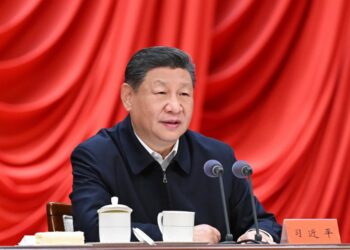Visitors interact with a robot dog at the World Conference on IA 2025, July 29, 2025 in Shanghai, in eastern China. (Photo: Chen Haoming)
China aims to carry out major advances in the application of artificial intelligence (AI) in key sectors by 2027, an official said on Friday when presenting the country’s latest efforts to accelerate the development of AI.
During a press conference, Huo Fupeng, director of the development center focused on the National Development and Reformation Commission (CNDR), described the next two years as a “crucial period” for the deployment of AI. He called for the mobilization of resources from all over society to advance six priority areas: science and technology, industry, consumption, public well-being, governance and global cooperation.
The remarks of Mr. Huo intervene while China published a series of guidelines at the start of the week aimed at implementing the “AI Plus” initiative, which defines a systemic approach to strengthen AI support infrastructures and accelerate the integration of AI technology in the economic and social fields.
This new political document constitutes a key step in the development of new quality productive forces and a necessary measure to promote the transformation of the digital economy into an intelligent economy and an intelligent society, he said.
The document defines three flagship objectives. By 2027, new generation intelligent terminals and intelligent agents are expected to reach a penetration rate greater than 70%, the key industries of the intelligent economy knowing rapid expansion. By 2030, this penetration rate should exceed 90%, allowing AI to become an important economic engine. By 2035, China aims to fully enter a new phase of intelligent economy and intelligent social development.
The CNDR stressed that this last initiative was only a first step, which will be followed by a set of political measures, financial support and institutional innovations.
Zhang Kailin, deputy director of the Innovation and Development Department of High Technologies of the CNDR, said that the CNDR would present more detailed sectoral plans and clearer political orientations, while accelerating the development of standards aimed at promoting the sharing of data, the interoperability of models and coordinated growth in AI systems.








